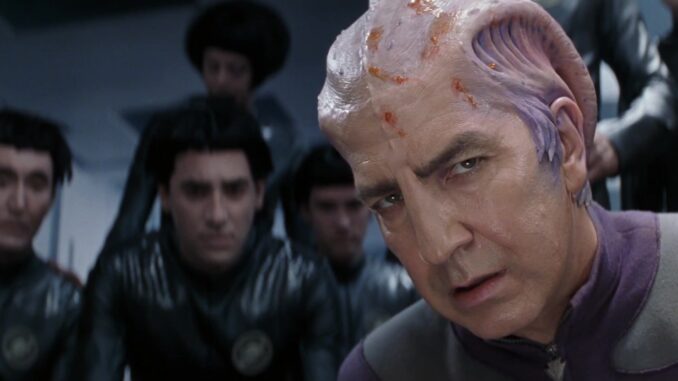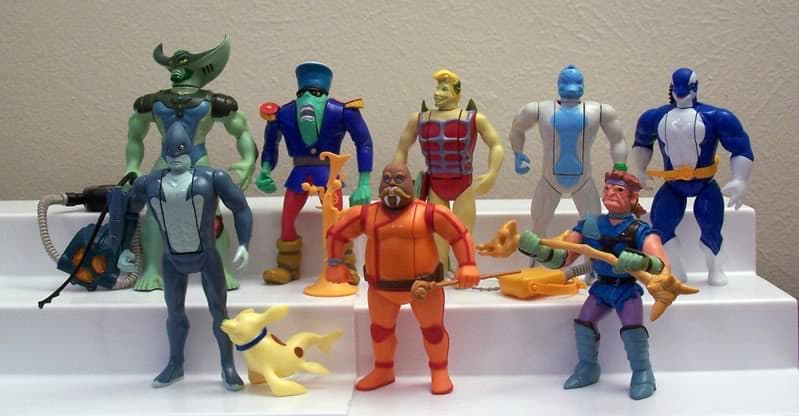Patricia Highsmash
Puns and Word-Os
by Travis Hedge Coke
If we did not love and benefit directly from puns, pornography would not be using them as often as sex and nudity since before there were motion pictures.
The advent of movie with sound saw an advance in how pop entertainment handled terminology, because very rarely did someone bring with them to the theatre a dictionary and a flashlight to use to peruse it. Screenwriters learned they could slip slang or unusual words into a script and have them float by unnoticed or misinterpreted by many, delighting linguists, people savvy to the slang, and nerds who just like word gaming however you do it. Nerd culture is antiauthoritarian any time except when they want to be the authorities.
If the Comics Code Authority asks, “freaking” is not a euphemism for, “fucking,” and, “leman,” just means, “really good roommate.”

The Thundercats are named Lion-O and Panthro because kids can sort out who is like a lion, who like a panther. The weapons in the Star Wars franchise are all incredibly descriptive, like their narcotics, except for “midichlorians,” which simply sound like a science thing.
The 1995 action movie, The Rock, knows we might not be able to look up, “VX” to see that it is a deadly nerve agent, or that VX actually stands for, “venomous agent X,” so they make sure to say, aloud, every time VX is mentioned, that it is deadly, “poison gas,” “a serious problem,” and that it could kill sixty or seventy thousand people. They make sure to yell that last part.
But, a battery of missiles carrying VX gas also simply sounds like a danger.

A Ramble
1939’s Finnegans Wake, a novel by James Joyce, is so self-pleasingly a work of sheer geek that it breaks the backs of words to fit more puns in. Finnegans Wake is Lemarckism applied to language, trying to force lingual evolution through the inheritance of acquired characteristics.
English-language comics have had a higher ratio of rare words and technical terms than comparable prose or television since the invention of commercial television. This fills comics people with pride even when they, as individuals, do not care one way or the other about an expansive vocabulary. It is a social measure.
Finnegans Wake and Star Trek, The Principia Discordia, Robert Heinlein’s Future History, the extreme linguistics and lingual histories that shape JRR Tolkien’s Middle Earth stories, from The Lord of the Rings to one of those fuzzy, barely titled fragments he probably wrote as a layer of jokes on the back of someone’s assignment during a faculty meeting. Geek culture and all other cultures have been growing more linguistically blurred and more semantically complex and we can only blame the new and many ways we have to record the word so far.
In the 1960s, Roy Thomas introduces the parody title as a mainstream technique in comics. A phrase or title from a more respected, usually literary work, with a minor tweak, and bang! boom! new title for you comic, which has instant recognizability and just enough of a wink of knowingness to it that it appeals to the geek drive to be on the inside track.
As mainstream anglophone culture becomes close to synonymous with geek culture, we may even take pride in slang terms achieving a fnord level, both inside joke and near-meaningless semblance, as right wing or terroristic terms like chad and simp and based are recouped by leftists and leftist terms like woke and problematic are coopted into attacks that produce cognitive dissonance.
The urge to be on the inside turns into acknowledging the inside is another’s outside. Prizing specificity and knowledge gives way to affected ignorance as a codifier and reifier of other knowledge, gives way to calling all sports, “sportsball.”
While Joyce would go back in and make Finnegans Wake more complex and more opaque in order to promote a simplicity and directness, sportsball attempts primacy by affecting a blunt ignorance and vacancy of potential.
The X-Files episode, Forehead Sweat, from the final final (“until next time” final) 2018 season, has nerds throwing technical terms and their soundalikes and proxies back and forth, using technical-seeming terms as ideation lubricants, and near rhymes and near-homonyms to confuse and to stop conversation. The “Mandela effect,” is argued to be the “Mengele effect.” Whether a title belongs to The Twilight Zone or The Outer Limits is debated without acknowledgment that more than those two shows exist. The episode is about language as weapon, language as thing, and thing as language, without appearing too complex or dangerous, and features some of the most direct political commentary from the series or franchise to date.
Language is powerful, and part of geek culture is, sometimes, making out that language is more powerful than it is.
Lubricant
Arguably, lubricant terms have accurate uses in entertainment somewhere in the past. Someone, at some point, knew that, gunsel, meant, essentially, bottom, and not guy with gun. Someone else did not know what gunsel meant, and as a fictional man’s fictional bottom was holding a gun, they assumed it meant a man holding a gun. It has gun right in the word, after all, and they may also be unfamiliar with the concept and term, as well, of bottom or one who bottoms.
Likely, the first person to use the term, neutrino, in fiction, knew what the word meant and how it applied in the real world. But, many readers did not, and some of those readers also made fiction, and so neutrino becomes a word that has less meaning and more inference. Neutrino becomes a way to change one situation to another in a story or to justify a plot point. Neutrino becomes lubricant for the narrative, color for the part where the television show or comic book tells us, in subtle, coded language, to not pay too much attention to this part, but stick with the human story.
In both these cases, the precise meaning of the term is less important than how the term allows us to gloss over precision. If the precise meaning of gunsel was vital, we would be unable to continue with a sensible narrative.

Poggers, zoinks, By Grapthar’s hammer are lubricants in and outside of fiction.
“The Clone Wars” in the first Star Wars movie is lubricant. In later movies, it is not. Some words or phrases are only lubricants until they are not. Until they have clear and clearly functional application. Polarity can be a lubricant in Star Trek, but phasers should never be. The in-context functional application of phasers is made too clear.
Meaningful Name
“I’ve confirmed the location of Praxis, but…”
“What is it?”
“I cannot confirm the existence of Praxis.”
In Romuald Racioppo’s PJ Masks, the lizard- and cat-themed superheroes have names a little far afield from their theme, but the owl-masked hero might be confusing, so she is named Bibou; Owl. In the English-language version, she is, Owlette, to – I suppose – reaffirm the she is a girl, too.
Unlike the lubricant, the Meaningful Word is so important that, when it cannot smoothly be fitted into the narrative or dialogue, without seeming didactic or pedantic or just plain insulting to our intelligence, Meaningful Word is simply slotted in as the name of a place, person, or thing. Maybe the meaningful word is slightly misspelled, presented as a foreign term which is a homonym to our familiar term, or embedded inside a longer name.
Star Trek VI: The Undiscovered Country is very concerned with praxis in both its traditional meanings. Praxis meaning practice as distinguished from theory, and praxis as custom and accepted practice in a tradition. But, the movie already has a borrowed title (which we will address below) and a heavy weight of the Cold War, recently come to an end, suffused throughout the entire runtime. To say the word, praxis, to introduce it narratively, would mean the movie would have to pause to define it and to adhere, then, to a rhetoric rather than a feeling of Cold War NATO/Communism dynamic, through the lens of out of date cold warriors realizing their theory was not their practice.
Naming a planet, a moon, a ship or city or person after real world term both honors that, in the real world, places and people and things are frequently given names that are, at least etymologically, tied to specific meanings and words. But, in fictionalizing, shifting away from etymology to pure chance, they can be more subtly introduced than as direct, real world terms or names with direct, real world forebears.

The homeworld of the Klingons, in Star Trek, is Qo’noS or Kronos, which is pronounced, “Chronos.” Chronos is both ancient Greek for, “time,” and personified in story and myth as a godlike figure who slayed his father at behest of his mother, Earth, cursing Chronos, or Cronus, to be cursed to also be overtaken by his children, who are a core group of the ancient Greek ruling gods.
Qo’noS and Praxis allow themes of time, self-destruction, mutual self-destruction, aging, jealousy, rage, humility, hubris, and forced political awakening, without demanding their recognition by audiences, best serving a film which is not a polemic or lecture, but foremost a piece of entertainment.
Word-Os
A variant on the Meaningful Name, Word-Os are more common in entertainment aimed at children, but particularly delight a broad range of geeks because of their inherent punnish nature. Like it sounds, the Word-O is a name or term which is a preexisting, often simple word, with an extra syllable slapped onto it. In the 1987 Rankin & Bass cartoon, TigerSharks, the oceans-only planet the characters work on is called, Water-o. A slight shift in the pronunciation of the a in water aids in the nominal disguise, but it is nonetheless noticeable to even small children who savvy English that this is a derivative of water.

The difference between the two techniques allows for a sense of shared awareness, while also recognizing a sense of internal logic to the world. We the audience know that the planet is named for water, but internally, there is enough difference that the characters never need notice. In The Undiscovered Country, however, it is presumably through sheer force of will that no character, especially the politically astute, the snarky, or the geeky do not comment on Praxis’ name given their immediate and relevant situation.
Word-Os teach audiences to separate information meant for the audience and information meant for characters inside the world of the fiction. Word-Os keep us in the loop.





